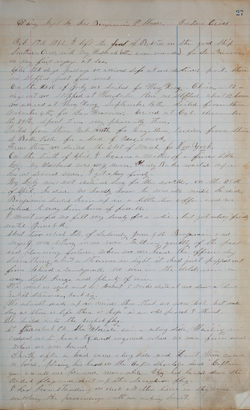Collections Online
Lucy Lord Howes Hooper diary, 1862-1863, pages with entries for 6-12 June 1863
To order an image, navigate to the full
display and click "request this image"
on the blue toolbar.
-
Choose an alternate description of this item written for these projects:
- Main description
[ This description is from the project: Civil War ]
In this June 1863 diary entry, Lucy Lord Howes describes her capture by the crew of the Confederate commerce raider CSS Florida. Howes and her civilian husband Captain Benjamin Howes were aboard the merchant ship Southern Cross, returning from Mazatlan, Mexico, with a cargo of brazilwood, when they encountered the Confederate ship. Howes describes how she and her husband, along with the other officers and crew, were forced to board the Florida under adverse conditions, carrying minimal personal effects, before the Southern Cross was looted and burned.
Lucy Jane Lord was born on 29 September 1840 to William E. and Lydia (Getchell) Lord in Dennis, Massachusetts. In July of 1860, Lucy married Benjamin Perkins Howes, a merchant seaman, who was born in Dennis in October of 1835. Shortly before their marriage, Benjamin Howes was named captain of the Southern Cross, a ship built in 1851 for Baker & Morrill of Boston. After their marriage, Lucy accompanied her husband on extended sailing trips aboard the Southern Cross.
The CSS Florida (originally named Oreto) was built in Great Britain, having been secretly commissioned by the Confederate Navy. In early 1862, she sailed out of England for Nassau, Bahamas, where, in August of that year, she was commissioned under the command of Confederate Lieutenant John Newland Maffitt. Under his command, the Florida ran the Union blockade twice, and seized and destroyed twenty two merchant vessels in the North Atlantic. In February of 1864, Maffitt gave up his command due to failing health and the Florida eluded capture until October of 1864 when she was overtaken in the dead of night by the USS Wachusetts off the coast of Brazil. Returned to the United States as a prize, the Florida sank after a collision with USAT Alliance in November 1864 at Newport News, Virginia.
In her diary, Howes notes that, although being held prisoner aboard his ship, Captain Maffitt behaved graciously towards her. He gave up his own sleeping quarters on the steamer to ensure that she had suitable accommodations. And when he ordered the Southern Cross to be burned, he warned her not to watch the conflagration as it might be too upsetting for her. Maffitt likewise attempted to alleviate some of the boredom she experienced as a result of her capture and imprisonment, especially since she was deprived of her books and other treasured belongings. He taught her to play solitaire, a card game, she writes, that frequently entertained her during her captivity. And during her frequent discussions with him, Howes discovered his fondness for Cape Cod; he described the Cape Cod girls as “great flirts” in the course of their conversation.
The Howes were held prisoner for six long and tedious days, before being rescued by the French steamer Fleur de Para. Flying a British flag, Captain Maffitt asserted that his ship had rescued the passengers and crew from the burning Southern Cross. He then released both of the Howes; Mr. Baker, the nephew of the Southern Cross’s owner; and the ship’s four officers to the French. The rest of the Southern Cross’s fourteen crew members remained aboard the Florida.
The Fleur de Para was bound for Ceará in northeast Brazil, and arrived there in early July. Lucy and Benjamin stayed in several port cities in Brazil until they were able to secure passage on an American steamer bound for New York. Finally departing Brazil on 24 August, they sailed for New York, eventually returning to Massachusetts.
In September 1866, Benjamin Howes was killed by Chinese pirates, who boarded his ship outside Hong Kong. In 1868, Lucy married Sylvester Hooper and moved back to Cape Cod. Several years later, Sylvester abandoned Lucy and their children. Lucy Lord Howes Hooper died in Rosebud, Oregon, in 1926.
Sources for Further Reading
This entry is excerpted from the first volume of Lucy Lord Howes Hooper diaries held by the MHS. This diary, spanning late 1862-1863, includes both Lucy Howes’ and her husband’s accounts of their capture by the CSS Florida. A second diary volume covering 1866 to 1909 includes information about the death of Benjamin Howes at the hands of pirates, and follows Lucy’s travels throughout New England in her later life.
Maffitt, Emma Martin. The Life and Services of John Newland Maffitt. New York: The Neale Publishing Company, 1906.
Revised List of Claims filed with the Department of State Growing out of the Acts Committed by the Several Vessels, Which have Given Rise to the Claims Generically Known as the Alabama Claims. Washington: Government Print Office, 1872, p. 195-197.

